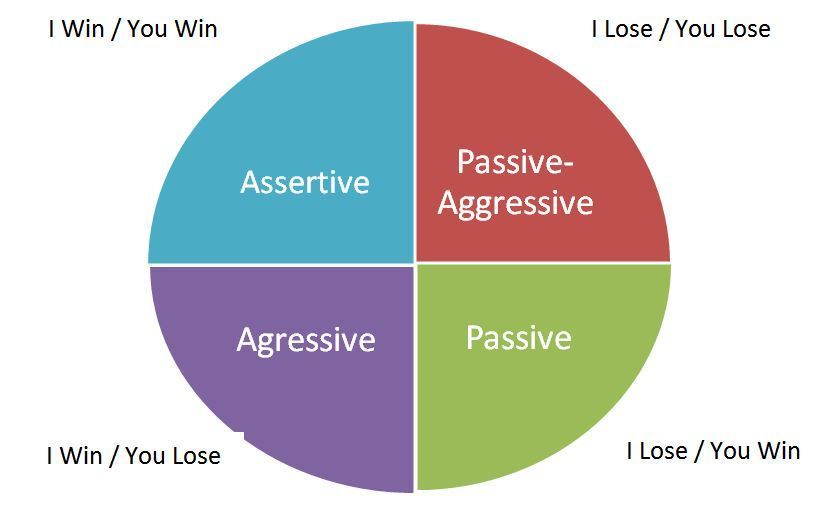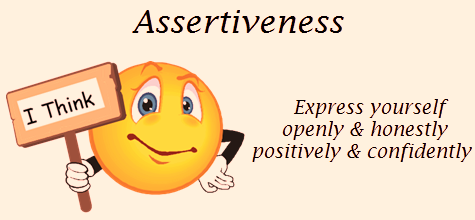Most of our communication fall traps to the common aggressive and passive communication. Aggressive communication is usually explosive, threatening, self absorbed and attacking in nature. Passive communication is usually powerless and filled with denial, shame and low self esteem.

Assertiveness refers to one’s ability to stand up with confidence for the rights of oneself and that of others in a calm, composed and positive way, without an intention of hurting others through one’s words or behaviour. In simple words, assertive people stand for what they believe, ask for what they want and say “no” to what they do not want. Assertive people have high levels of self esteem, which does not generally get compromised through words and deeds.
Assertive communication refers to the art of communicating your beliefs, calmly asking for what you want, and respectfully saying “no” to things which you do not want or do not like. Assertive communication is open, honest and respectful. Practicing assertive communication for a long term helps you get rid of fears, anxiety, stress, dependability. Your communication is run by the value system you uphold and hence it fosters more and better understandings and relationships. Assertive people are empathetic and they have the ability to disagree respectfully with others, at the same time maintaining good relationship with them. Even the criticism appears in the form of constructive feedback. Assertiveness relates to an understanding of the other person’s point of view, even while placing forth your view points.

Assertive communication helps win negotiations and resolve conflicts.
Story
Morris the dog was walking past a property one day and he was suddenly confronted by a large black dog who barked ferociously through the fence at him.
“What are you doing?’ asked Morris.
“I’m guarding this property.” responded the black dog.
“What are you barking at me for? asked Morris.
“Because you’re a threat. Everyone has the potential to break in and steal from me, so I’m not taking any risks and am barking at everyone.”
Morris shrugged his shoulders and walked away, thinking about how much energy the black dog was unnecessarily wasting.
The next day, he walked past the same property, but instead of being confronted by the vicious guard dog, he was met by a furry ball of fluff.
“What happened to the large black dog?” he asked.
“He annoyed his owners by barking all of the time, so they gave him away and replaced him with me.” replied the ball of fluff.
“You don’t look very scary.” observed Morris.
“I’m not. You never have to worry about me being too angry.”
“What would you do if someone tried to steal from you?” asked Morris.
“Why would anyone try to steal from me? I’m such a nice cute doggy that no-one would ever take advantage of me.”
Morris shrugged his shoulders and walked away, hoping that the little ball of fluff would be OK.
The next day he walked past the same property and was met by a large golden retriever.
“What happened to the little ball of fluff?” Morris asked.
“Some intruders came last night and all he did was roll over to have his belly scratched while the place was ransacked.” replied the retriever.
“So, what’s your strategy for guarding this place?” asked Morris.
“I’ve learned that not everyone’s a threat, so there’s no point in barking at everyone and keeping them at a distance, but I’ve also learned that being nice and polite won’t always cut it either as not everyone has my best interest at heart. Others will always know that I’m here, but I feel comfortable enough with myself that I don’t need to rant and rave to be heard or look after everyone else’s needs to be liked. I’ll just be calm and clear when communicating, decreasing the risk of being taken the wrong way.”
“I think I’ll be seeing a lot more of you,” said Morris, suitably impressed as he went on his way.
Let me encourage you to learn from this story that you don’t need to be an angry, rabid dog or a delightful ball of fluff to be successful in what you’re doing.
Instead, learn to express yourself with clarity, honesty and calmness and be assertive.
Activity
Write any three strategies that can be practiced on a daily basis to become assertive.
______________________________________________________________
Quote
“The best gifts are never given, but claimed.” ― Warren Ellis
Take Away
1. Assertiveness refers to one’s ability to stand up with confidence for the rights of oneself and that of others in a calm, composed and positive way, without an intention of hurting others through one’s words or behaviour
2. Practicing assertive communication for a long term helps you get rid of fears, anxiety, stress, dependability.
3. Assertive communication helps win negotiations and resolve conflicts. It fosters better relationship with others.


